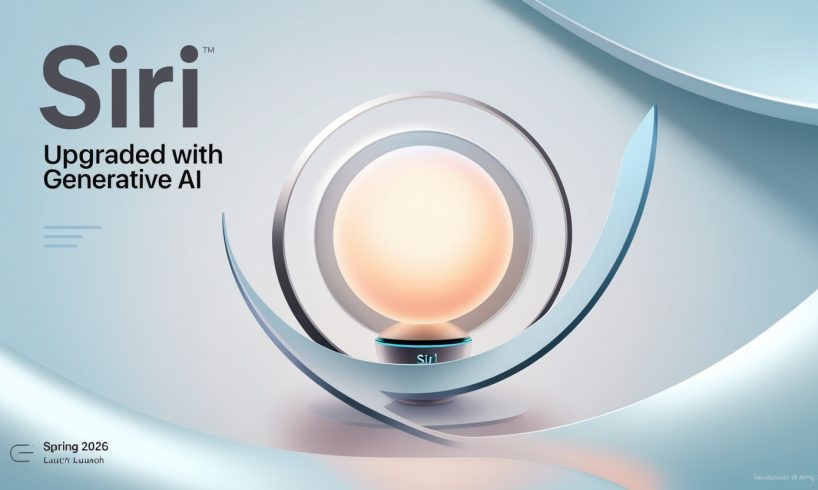
Apple is setting its sights on spring 2026 to release a long-anticipated and significantly delayed overhaul of Siri, its voice assistant. This next-generation version of Siri is expected to be deeply powered by generative AI, a move that brings Apple more in line with rivals like Google’s Gemini, OpenAI’s ChatGPT, and Amazon’s Alexa upgrades. The delay, however, has highlighted the challenges Apple faces in keeping pace in the rapidly evolving artificial intelligence race.
A Long-Awaited Upgrade
Siri, introduced in 2011, was one of the first mainstream voice assistants on the market. But in recent years, it has struggled to keep up with the more dynamic and conversational capabilities of generative AI tools. With the boom in large language models (LLMs), Apple’s relatively conservative AI strategy has come under increasing scrutiny.
According to recent reports, Apple had initially aimed to bring these advanced features to Siri sooner. However, internal delays and technical challenges have pushed the release target to spring 2026. The upgrade will be part of Apple’s broader AI initiative, which CEO Tim Cook recently referred to as a “transformational opportunity” during Apple’s Worldwide Developers Conference (WWDC).
What to Expect from the New Siri
The new Siri is expected to be powered by Apple’s own generative AI models, developed under the codename “Ajax.” Key features will likely include:
- Improved Contextual Understanding: The upgraded Siri will better understand and remember context over longer conversations, enabling more natural interactions.
- On-Device Processing: Apple is emphasizing privacy and security by ensuring many AI tasks are handled on-device, reducing reliance on cloud processing.
- Enhanced Integration with Apple Ecosystem: Siri’s new capabilities will be closely integrated with iOS, macOS, and other Apple platforms, allowing users to perform tasks like editing photos, composing emails, or scheduling tasks more seamlessly using voice alone.
- App Intents and Automation: Developers will gain deeper access to Siri’s capabilities via App Intents and Shortcuts, letting users automate complex tasks more easily with natural language.
Catching Up in the AI Race
Apple’s delay contrasts sharply with the rapid pace of development seen from competitors. Google has already launched Gemini across its devices, while Microsoft and OpenAI continue integrating ChatGPT into Office tools and Windows. Amazon, meanwhile, has revamped Alexa to support generative AI-powered conversations.
Apple’s more cautious approach may stem from its strong emphasis on user privacy, on-device processing, and tight ecosystem integration. While these priorities slow development compared to cloud-first rivals, they also give Apple an edge in delivering AI in a secure, reliable, and energy-efficient manner.
WWDC 2025: A Key Milestone
Before the spring 2026 launch, Apple is expected to showcase a preview of the upgraded Siri at WWDC 2025. This event will likely offer developers early access to new APIs and allow Apple to begin gathering feedback ahead of the public rollout.
Reports also suggest that while the full AI upgrade won’t be ready until 2026, incremental improvements will begin appearing in iOS 19, expected in late 2025. These could include better voice command reliability, more flexible Shortcuts, and early generative AI features for supported iPhones and iPads.
Hardware and Software Readiness
The new Siri experience will require significant on-device computing power. Apple is expected to optimize the AI system for its latest chips—especially the upcoming M5 and A19 Bionic processors—meaning some older devices may not support the full range of features.
Additionally, Apple has been building out its server-side infrastructure to support cloud-based generative tasks when necessary. This hybrid AI strategy—splitting tasks between the device and the cloud—is central to how Siri’s new capabilities will function.
Why It Matters
Siri’s reinvention isn’t just about competing with Alexa or ChatGPT. It’s about redefining the way users interact with technology. A smarter, more intuitive Siri could transform workflows, boost accessibility, and solidify Apple’s leadership in designing human-centered computing experiences.
If Apple delivers on its promise of privacy-focused, seamlessly integrated AI, the 2026 Siri upgrade may prove to be a defining moment not just for the company—but for the future of voice-driven computing.

I am a person who is positive about every aspect of life.I have always been an achiever be it academics or professional life. I believe in success through hard work & dedication.
Technology Blogger at TechnoSecrets.com





